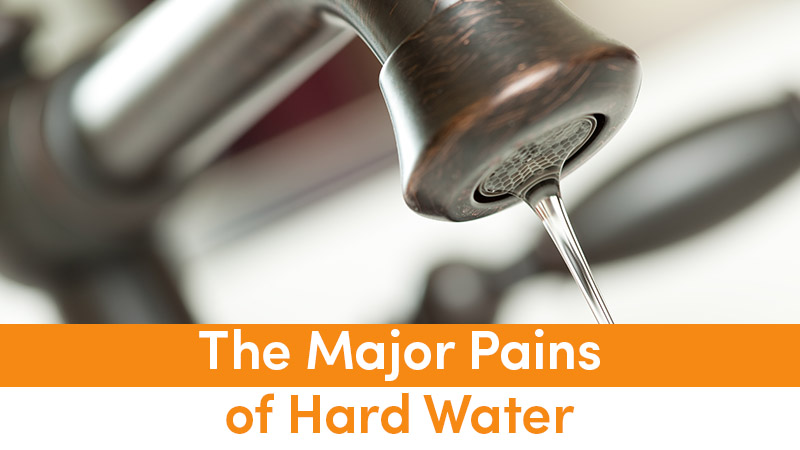The Major Pains of Hard Water

If you have hard
water in your home, you already know that it can leave unsightly deposits in your shower and
sink that can be difficult to clean. What you may not realize is it affects more than the appearance of your bathroom. Hard water can prevent your shampoo and body wash from sudsing properly and make cleaning your hair and body more difficult. It can also leave your laundry looking dingy and affect the efficiency of your washer. Understanding what hard water is and how to combat its effects is essential.
What is hard water?
Hard water is water that contains high amounts of minerals, typically calcium, magnesium and limestone. Hard water may also contain iron and other trace minerals.
How do the minerals get in the water?
Minerals in your water are generally naturally occurring. Limestone and magnesium come from groundwater percolating through natural beds of limestone, while iron frequently comes from the soil or from rivers and lakes. These minerals typically do not pose a health risk (although they can cause skin dryness or irritations) and are common in drinking water in the United States. In fact, according to the U.S. Geological Survey approximately 85 percent of the homes in the United States have hard water.
How do you know if you have hard water?
You can find the mineral content in your water with a water test, but that is seldom necessary. Look for these telltale signs you have hard water.
- Scale and soap scum building up on your shower, tub or sink. This looks white and sticky and resists your efforts to clean with regular bathroom cleaners.
- Rust stains in the toilet or around your faucets, or even coating the shower curtain or shower walls indicate iron in your water. You may notice orange stains on the grout or between tiles.
- Shampoo and bath washes fail to create suds.
- Laundry appears dingy or gray.
- Tea kettles develop a thick, white buildup on the inside.
- Coffee makers need frequent cleaning or die an early death.

How do you clean hard water stains?
Vinegar or lemon juice is often effective for cleaning hard water stains and deposits from your shower, tub or sink, but it does require frequent cleaning to prevent it from building up. Likewise, coffee makers and tea kettles can be cleaned with vinegar and water regularly to keep the effects of hard water at bay.
What else can you do to eliminate the effects of hard water?
Installing a whole house filter to remove the minerals from your hard water will provide the best protection against its effects. This will prevent buildup in your pipes, solve your laundry issues and make soaps and shampoos work better in the shower, too. It will also protect your dishwasher from a build-up of hard water deposits. If a whole house filtering system is not an option, installing one on your shower head will prevent stains in the tub and shower and will make your shampoo and body wash work better too, leaving your skin softer and feeling smooth.
If you are having issues with hard water in your home, contact the experts at Amanda Plumbing to discuss the best solution for your home. We provide a free estimate so you always know what to expect with our service.